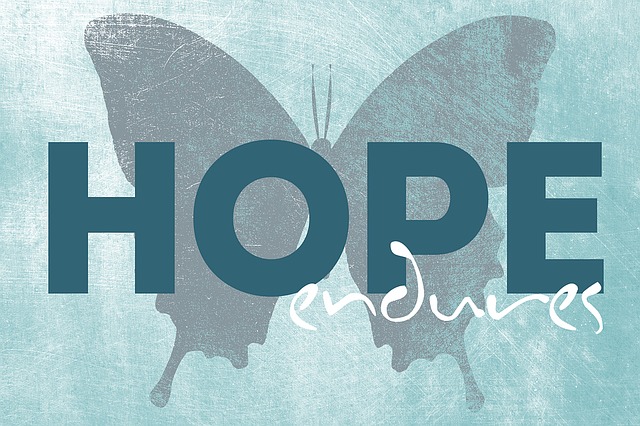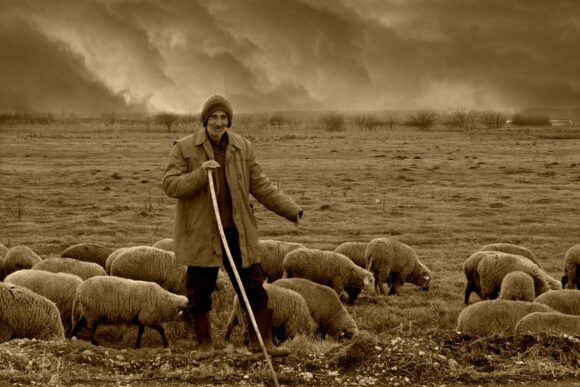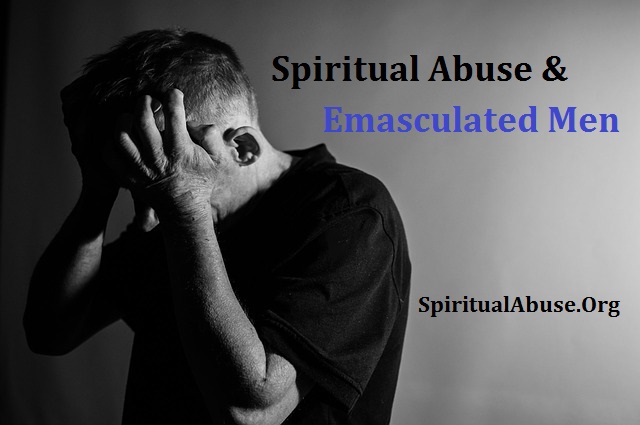The following is a guest essay that goes along with my previous writing on Spiritual Abuse & Emasculated Men but is much more in depth. It is written by Dr. Michael Warstler.
Spiritual abuse is a phenomenon that most certainly occurs in a diverse range of religious organizations; from small to large and from organized to independent. However, while spiritual abuse might have specific elements, there is no formal method for measuring the significance of the experience. Recently, I read a post asking about thoughts on whether women experienced more abuse than men. In early 2017 I had similar questions and sought to answer them through conducting a formal study to satisfy the dissertation requirements of my Doctorate. Since it is rather difficult to quantify experienced spiritual abuse, a survey was adopted to measure the perceptions of one’s experiences in the frame of group psychological abuse. The survey provided 31 questions that fed into six primary elements of a group psychological abuse taxonomy. Options for each question were in Likert style format ranging from “zero” or “none” to “four” and “continually.”
While all elements of group psychosocial abuse were experienced to some degree, the element that rose to the top in perceived severity was the imposition of a single and extraordinary authority. Female participants experienced the component of the imposition of a single and extraordinary authority at a 76.69 percentage rank; whereas, male participants experienced the same component at a much lower 35.78 percentage rank. This admission does not denote that men did not experience the imposition of a single and extraordinary authority; it means, rather, that while they perceived it to a lesser degree, it still occurred. It is of interest that of the 68 men who participated in this study, 51 annotated that they were in leadership or had been in leadership. Being that groups who impose a single and extraordinary authority are often highly narcissistic, it was assumed that the results of male leader participants would be on the low end. Why would anyone in a leadership position with a faith tradition that is being studied admit that they were perpetrators of such abuse?
What I am trying to point out is that whether women perceived their experiences to be more severe than men, the fact is that both men and women experienced abuses – they are just experienced in different ways. The element of the imposition of a single and extraordinary authority is certainly of interest to me in how it applies to male followers. It seems that much of the abuse men experience with this element is that of deep psychological and emotional strain. The psychological and emotional strain that I would like to focus on here is that of infantilization and emasculation of men – elements that ultimately destabilize the home and weaken marital bonds.
One of the primary elements used to implement a single and extraordinary authority in religious traditions such as Oneness Pentecostalism is that of headship. Headship entails that God is ultimately the head of authority, and below that falls a pastor. Next in the line of spiritual authority is the husband, then wife, and lastly children. While I am not here to argue the biblical implications and precedents of headship, I am interested in why it is practiced and what the potential consequences are. Here I believe it is important that I discuss what might occur if a husband is not in the church (i.e. was never in attendance or a member), is “non-participant” while in attendance, or is “backslidden” (i.e. a former member who no longer attends church or believes). In these scenarios, a husband is typically deemed as outside the line of spiritual authority and not in a position of headship over his wife and children.
It is common in these situations that a pastor takes the place of headship over a woman when the husband does not “fulfill” his role. This also applies to many adult single women or divorced women within the congregation. But when a woman is still married, her unsuspecting non-believing husband might be in for a shock when he discovers that most of his wife’s basic and major life choices must be discussed with her pastor first. Every detail from taking a camping trip to major purchases will now be brought to the pastor for approval. This essentially removes the husband from his position in his own home – Thus, why I have labeled this essay as religious cuckoldry. This is a position that a man might find himself in when the pastor of his wife’s church replaces him. Two anonymous comments below detail similar experiences:
“Apparently, the pastor told my wife that if I don’t come around, and fall in line with all that he teaches. ‘She shouldn’t stay with me.’ The same man who married us suggests that, for the sake of her soul, she should probably leave me.”
“This is when the man is reduced to bringing home the bacon, paying the bills, and supplying non-emotional or non-spiritual needs. Anything else is perceived as an effort to try and convince or change the doctrine/beliefs of the wife, which in turn leads to accusations of the husband trying to break up the family.”
Men who find themselves in these situations ultimately either seek divorce or end up living with the situation despite the deep emotional and psychological pain experienced. In my own experience as a former Oneness/Apostolic Pentecostal divorce was essentially forbidden. In addition, my now ex-wife was a former Jehovah’s Witness and her organization duly forbid divorce. On one side I was being fed that I was to be a leader of my home and in a place of headship, and from another side the elders of my wife’s religion were replacing me – it was a lose-lose situation that ultimately took a major toll on our marriage for several years.
Legalistic religious beliefs ultimately lead to infantilization, and in groups led by an absolute authority, the emasculation in men. This requires that a grown man rescind his ability to make choices about his own life and family and give them to another man. To be “saved” one must fully submit to their pastor (to be under the headship and in alignment with God). While it should be understood that no two organizations are alike and that these experiences may be perceived on a wide spectrum, submitting to another man in a destructive organization quite literally strips a man of his own essence. This leads me to the discussion of a deeper nature found in such groups – the essence of man.
Legalism leads to an immature spirituality – one that is based on the constant attention of outward appearance and expression. One could easily witness similar phenomena in remote tribes – individuals within these groups can be often observed acting in a more “primitive” fashion than what we are used to (i.e. much like Pentecostalism, these groups can be witnessed practicing glossolalia, ecstatic dancing, etc.). In addition, religious groups that place their primary focus on the more primal urges (expression, appearance, and emotionalism) are just as often sexually repressed – and being sexually repressed, they become sexually obsessed. Since psychological control is also achieved at the physiological and physical level, it makes sense that sexual repression becomes a strong tool for coercion and control.
It is here that I believe we should discuss and accept that, physiologically, we are deeply tied to our primal roots on a subconscious level. For example, (and slightly off topic) some studies indicate that the menstrual cycle of women who interact in groups sync with the “alpha female” (a phenomenon formally referred to as “socially mediated synchrony”, as discussed by University of Oxford anthropologist Alexandra Alvergne). It might also be assumed that men are physiologically affected by being domineered by another man (some refer to this as alpha and beta males, but most research points to these as being concepts rather than scientific fact). Of course we do not enjoy discussing these topics, because it reminds us that “love” is more likely than not a chemical reaction in the brain and that we are ultimately controlled by our primal urges (we would rather continue to believe in soulmates and romance). However, it is not my intention to dehumanize us, but to simply consider why we do what we do.
The concept of the rebellious “alpha male” could almost be seen in any spiritual leadership manual. I can see it now, “Men have a strong difficulty submitting themselves to another male.” It is my assumption that primal groups act in such a way as to strengthen group survival (often referred to as herd immunity/strength). It makes sense that in order for a group to survive (however, unhealthy it may be) singular leadership is desired. Too many “alpha” or “strong willed” leaders and the group could easily split. This oftentimes entails in the destructive organization that the leader be the only one to express “apex” characteristics such as wealth, intelligence, etc. This factor also leads up to a husband never measuring up or being good enough (even if they are a member of the faith tradition).
When, then, is it okay to display “apex” traits or to enjoy wealth and intelligence? It seems from my observation that it is only acceptable to do so if one is close to the leader of the organization. In this sense, these individuals are referred to as “colluders” (those who obey in order to reap social benefits); as opposed to “conformers” (those who obey out of fear). I have heard this described to me as being a pastor’s “henchmen” or “muscle” – however, it is probably easier to describe this as the pastor’s “inner circle.” Men within the inner circle can oftentimes be seen enjoying the benefits of their social status. In the inner circle one can also get around some of the legalistic rules without scrutiny. However, I have also witnessed successful men outside of the inner circle be publicly scrutinized for the same actions. In these groups it is often expected that all members give as much of their time, energy, and money that they can to the organization. However, it always seems that the more toxic the group, the more the pastor seems to have while his followers continue to sacrifice.
The following are simple observations:
– “Strong willed” males will not deal well with being treated in such a manner so they will push back aggressively and ultimately leave “backslide.”
– It seems that the more rigorous and fundamental the group, the more young males leave as soon as they are at an age where they are legal to make their own choices.
– Fathers who are not in the church typically try to pull their sons out through secular activities such as sports (organized sports are highly frowned upon in Oneness Pentecostalism and by the Jehovah’s Witnesses).
– If one backslides (leaves the church), I have witnessed them being shammed as “homosexual” or “effeminate.” I believe the emasculation of men is at play here as well.
– Some men that experience repressed masculinity manifest destructive behaviors and increased control behind the closed doors of their home – leading to the perpetuation of spiritual and psychological abuse from the husband/father to his wife and children.
– The more primal and emotional a group operates the more primal and emotional their responses will be to those who “backslide” or those who raise inquiry of their practices.
In closing, it is agreed that we often don’t enjoy hearing about these topics because consciously we do not like to align ourselves with the primal side of our nature. In this sense the conscious battles the subconscious. Because our primal nature is oftentimes crude, not wanting to accept it, we repress it. I also realize that it might be difficult to have one’s experiences of group psychological abuse relegated in the simplified terms of primal nature – however, at the root of a primal group, this is what occurs. What I am asking my readers to do is ask the “tougher” questions. Perhaps some healing and consolation can be found when we view our experiences in the frame of a much larger subconscious system. In doing so, we do not deny our humanity when discussing our original nature; we simply learn more about ourselves.
**These observations are not simply my own, but are collected from 1,000’s of individuals who have written me over the past few years.**
**The above essay, while complex, is not intended to be an in-depth analysis of a topic – nor is it intended to pass judgement or express preferences – for like any topic, several books could be written to discuss them. My purpose here is to simply develop theories and generate provocative, if not heretical thought. As noted by the great essayist Montaigne: “All I say is by way of discourse, and nothing by way of advice. I should not speak so boldly if it were my due to be believed.”**





